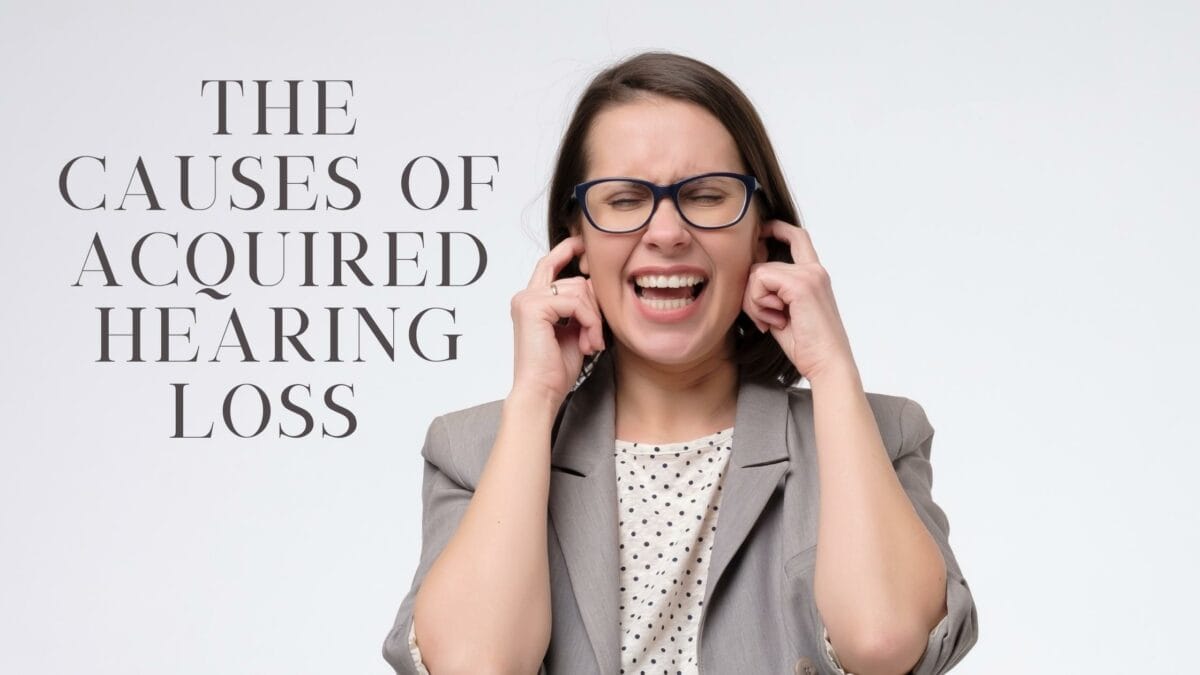Did you know that hearing loss is the third most common medical condition people experience today? Impacting nearly 1 in 6 people, over 48 million people live with hearing loss. Most hearing loss that people experience is acquired, meaning that it developed after birth. Understanding what causes hearing loss can better help you reduce your risk and protect your hearing health.
What Causes Acquired Hearing Loss?
Acquired hearing loss can develop at any point during one’s life. Several factors contribute to its development. A few common causes include the following:
- Aging: aging can be a significant indicator of hearing loss. Older adults are disproportionately impacted by hearing loss. According to the National Institute on Deafness and Other Communication Disorders:
- 1 in 3 adults, ages 65-75, have hearing loss
- 1 in 2 adults, ages 75 and over have disabling hearing loss
A few factors make older adults more vulnerable to experiencing impaired hearing. This includes the cumulative toll of noise exposure on the auditory system over time. Additionally, there are various medical conditions that older adults are also more likely to experience which increase the risk of hearing loss.
- Loud noise: Another common cause of hearing loss is loud noise. One-time or consistent exposure to loud noise can cause hearing loss. Loud noise can cause the sensory cells in the inner ear to lose sensitivity, making them increasingly vulnerable to death over time. These sensory cells are responsible for sending auditory information to the brain which is then able to further process and assign meaning to sound, allowing us to understand what we hear. Damage from loud noise prevents them from aiding the brain with processing incoming sound information, resulting in hearing loss.
- Medical conditions: Extensive research shows that various medical conditions are associated with hearing loss. Studies reveal that certain medical conditions increase the risk of developing hearing loss. This includes cardiovascular disease, diabetes, hypertension, and osteoporosis. These conditions impact blood and oxygen flow throughout the body including to the ears. This is needed to support the cells, bones, nerves, etc. which all participate in absorbing and processing sound.
- Ear obstructions: another cause of hearing loss is ear obstruction. This refers to any physical blockages that prevent sound from being fully absorbed and traveling through the ear and reaching the inner ear. Ear obstructions include an accumulation of earwax, growths, injury from inserting random objects into the ear, etc. Fortunately, this type of hearing loss is usually temporary and is addressed by removing the obstruction.
Other causes of hearing loss include head injuries, ear infections, autoimmune conditions, and inner ear disorders.
Recognizing Common Symptoms
Recognizing that you are experiencing changes to your hearing health is a critical step in seeking treatment. Early signs of hearing loss include:
- Tinnitus: a buzzing, ringing, or clicking like noise that can be experienced in one or both ears.
- Sounds are distorted or muffled.
- Finding yourself repeating “huh” or “what” in response to others saying something.
- Frequently asking others to repeat something they’ve said or to speak louder.
- Experiencing difficulty hearing in places with background noise or during conversations with multiple people.
- Increasing the volume on your television, phone, or other electronic devices.
- Lip reading to help identify words.
- Missing words or parts of a conversation, feeling confused, and not understanding what others are saying.
- Being able to hear more clearly in one ear compared to the other and trying to adjust so that the ear is in clear shot of the speaker.
These symptoms can be experienced from mild to severe, depending on the degree of hearing loss an individual is experiencing. Symptoms make effective communication challenging so conversations become difficult to participate in.
Treating Hearing Loss with Us
You can prioritize your hearing health today by calling us to schedule an appointment for a hearing consultation. Having your hearing tested regularly is a great way to protect your hearing health. Hearing tests establish a baseline of your hearing needs which makes it easier to identify any changes you may experience. Our team is invested in providing the services and individualized care that supports you thrive in daily life. Contact us to learn more!

